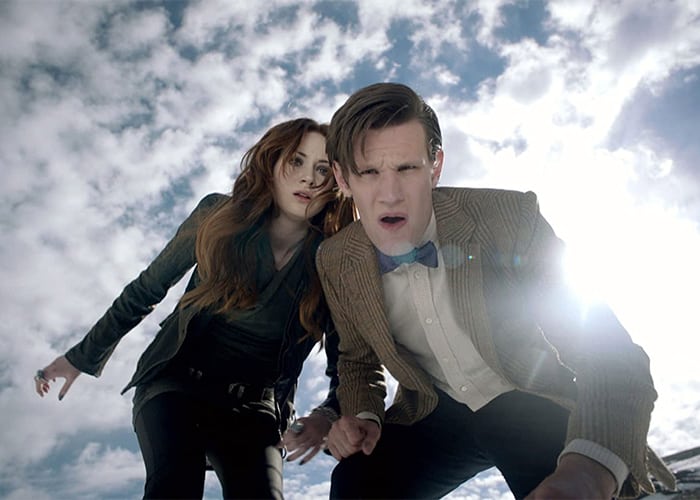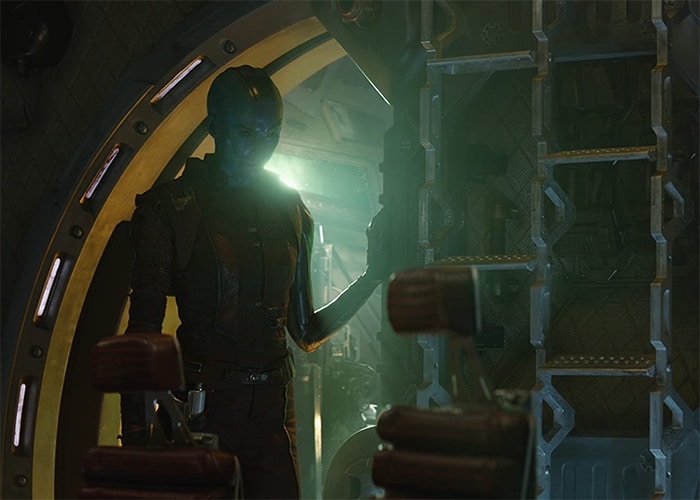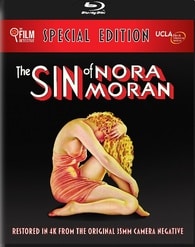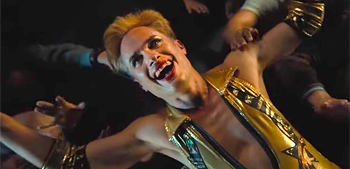How Karen Gillan Defies the Constraints of Genre
Welcome to Filmographies, a biweekly column for completists. Every edition brings a working actor’s resumé into focus as we learn about what makes them so compelling.
On the big screen, Karen Gillan is fighting until she’s blue in the face. Embracing the mantle of the Marvel Cinematic Universe’s alien antihero Nebula brought the lanky redheaded Scot to the world stage. Gillan’s stints in the Guardians of the Galaxy and Avengers movies solidify her status as a formidable blockbuster heroine for audiences to reckon with. That said, sci-fi aficionados recognize that she’s been working her way up to becoming a mainstream staple since her initial breakthrough on Doctor Who.
Gillan’s infectious charm and bold persona infuse screens across all manner of genres, all of which showcase a marked affinity for versatile, unexpected storytelling. If anything can be said about her part in something as massive and culturally influential as the Disney-Marvel machine, it is that the value of sustained public salience provides her with ample opportunity to dive into the experimental projects she gravitates towards.
But in many ways, Gillan’s fledgling breakout as the brazen leading lady in the fifth season of the Doctor Who revival highlights her strengths as an actress all around. Before her adventures in the TARDIS, her onscreen exploits were unfortunately considerably thinner. Gillan has minuscule parts in the British features New Town Killers and Outcast, both of which are the most interesting to ingest in hindsight of her existing success. After all, the former role amounts to a nameless cameo while in the latter she plays an ill-fated “best friend” character whose final moments are tinged with humiliation and loneliness.
Such films merely utilize Gillan’s skills at a surface level, willing her to adopt some kind of suy and sassy personality while keeping her characters woefully disposable. I would rather reference a project such as the 2008 television pilot Stacked to bring a little more depth to this archetype.
In Stacked, Gillan stars as one of three teenage sisters whose direct familial ties to the world of fashion photography and men’s magazines result in problems surrounding their personal image and self-worth. Gillan particularly taps into a well of dramatic honesty as the most troubled girl of the bunch, turning in the most promisingly emotive performance among the entire cast. Stacked features too many sprawling concerns to be of much impact, but Gillan’s portrayal of body image issues encourages audiences not to take girls and women at face value, adding necessary punch to the episode.
Doctor Who subsequently presents a similar set of challenges regarding its discussion of women’s bodies onscreen. At least, it does so at the beginning of Gillan’s tenure as Amelia “Amy” Pond, the human companion to the show’s eponymous extraterrestrial Time Lord protagonist. Funnily enough, this isn’t the first time the actress has appeared on the show. Gillan first portrayed an unnamed minor character in the Season 4 episode “The Fires of Pompeii,” donning pale face paint and billowy crimson robes as part of a sisterhood of soothsayers that the Doctor (then played by David Tennant) encounters on a mission. However, by the opening episode of Doctor Who’s fifth season, Gillan is – for better or worse – memorably introduced via an upwards tilt panning over the length of her legs while she’s dressed as a miniskirted police officer. Who works as a kissogram.
This would understandably raise eyebrows within the community of long-time Doctor Who fans. At the time Gillan and her co-stars Matt Smith and Arthur Darvill boarded the TARDIS, the series was experiencing a showrunner changeover from Russell T. Davies to Steven Moffat. This shift doubled down on the darker narrative overtones first presented at the start of the revival in 2005. Amy’s outfit choices are more noticeable in this context – especially this “sexy cop” first impression – seeing as it only adds to a discernibly grown-up aesthetic that could feel out of place in a show that was popularized as a family-friendly experience from its inception in 1963.
If this created any qualms for Who viewers in the first place, it’s impossible not to fall in love with Amy as a character, even as they first begin to get to know her early on in Season 5. At the heart of her expeditions with the Doctor is the age-old story about escapist fantasy. As is the case for other companions before her, Amy gets a coming-of-age arc of cosmic proportions, finding her definitive voice as a young woman through these adventures. The show’s most prolific villains supplement plots that uproot her most entrenched and relatable fears, putting her strength and tenacity to the test.

Admittedly, there are times when Amy’s agency is questionably handled. This principally occurs during Doctor Who’s sixth season, when she risks losing control over her mind and body due to an ambitious, unwarranted pregnancy storyline. Gillan saves this theoretically disastrously reductive arc by maintaining a strong sense of emotional investment in Amy’s fantastical shenanigans. She brings so much grounded realism to the role that it feels untenable to reduce the character to societally hard-wired stereotypes in spite of the show’s writing. “Amy’s Choice,” “Vincent and the Doctor,” and “The Girl Who Waited” are some of the strongest Doctor Who episodes because with all of Amy’s emotional complexity, biting wit, and adamant resilience, she beats the odds of her predetermined fate.
Gillan’s time on Doctor Who fortuitously carved out a multi-pronged path for her transition into other substantial onscreen work, both in and out of Hollywood. This trend begins in homegrown British properties like the biopic We’ll Take Manhattan. Gillan’s captivating dreaminess is at the center of this fictional retelling of the real-life love affair between fashion model Jean Shrimpton and photographer David Bailey. Her version of Shrimpton is imbued with a subdued softness, allowing the ingenue’s early career to blossom naturally amid naïve choices and heated arguments (and oh, what delightful chemistry she has with co-star Aneurin Barnard!).
The Scottish film Not Another Happy Ending conversely evidences that Gillan has a knack for gaucheness, too; one that’s fit for the bumbling affairs of the modern romantic-comedy. In the film, she plays a successful author wrestling with severe writer’s block and must combat several over-the-top situations to unpack the inexplicable connection between her writing process and the personal pain she stores within. Although there is a sense of witty pessimism permeating the silliness of Not Another Happy Ending, Gillan is seamless in depicting an array of emotional ups and downs.
Sadly, not all rom-coms are made equal. Gillan’s sparkling potential in Not Another Happy Ending makes her supporting appearance in Alex & the List frankly saddening. Don’t get me wrong – she is still a clear standout here. In a movie focused on the nuances of overlapping relationships, Gillan is the most adept performer, especially when she gets to act alongside Patrick Fugit’s eponymous lead. However, Alex & the List is ultimately frustratingly muted and wishy-washy with what it has to say about valuing one’s self-worth. And unfortunately, this dulls Gillan’s shine.
None of Gillan’s rom-com ventures engenders more embitterment in me than ABC’s Pygmalion-inspired Selfie, though; it was canceled far too soon! From the series’ pilot, it hits the ground running with an unapologetic premise that criticizes society’s heightening dependency on social media. Selfie sees Gillan in her first lead role in an American series playing Eliza Dooley, a self-obsessed socialite who realizes her image is in desperate need of an overhaul. Eliza finds a mentor in John Cho’s Henry Higgs, but what their union really makes way for is a wonderful tag-team effort of self-improvement for both parties. Despite a silly abundance of pop-culture references and a smattering of almost-cartoonish happenings, Selfie always had so much potential in its exploration of a quintessential modern-day relationship thanks to its two wonderfully charismatic actors at the forefront. Gillan is fearless and uproarious when digging into Eliza’s more outwardly hate-able side, but can be downright moving by Selfie’s later character-driven episodes.
Unsurprisingly, my other favorites among Gillan’s subsequent releases tend to share an analogous heartiness in expressing full-bodied, multifaceted sentiment. Not all of these projects need to be expressly lengthy for them to be effective either. For instance, Gillan stars in Jennifer Morrison’s Warning Labels, a gorgeously wistful short film about dealing with one’s flaws in search of love.
In the hyper-stylized world of Warning Labels — where people literally wear their presumed faults on little tags pinned to their shirts — a little love story between two CDC workers (portrayed by Gillan and Josh Lawson) blossoms. The short uses layers of metaphor to describe people as walking cautionary signs, but while others injuriously highlight these characters’ supposed faults, they are actually sweetly awkward and adorably imperfect – thus making them perfect for each other. Gillan glows as the bubbly quirky leading woman who quietly nurses old wounds. You can’t help but root for her.
Audiences also find themselves unequivocally on Gillan’s side in Mike Flanagan’s Oculus and the film showcases exactly why she needs to headline more scary movies ASAP. Gillan holds the fort of the ill-fated Russell family as Kaylie, one-half of two estranged siblings living in the aftermath of trauma. Suffering the spoils of murky memories related to the grisly deaths of their parents – for which her brother is convicted of – the two meet up as adults after Kaylie rediscovers an old family heirloom with potential supernatural qualities. She now believes that she can prove her one living family member innocent of murder via a series of taped paranormal phenomena.
Oculus blurs the lines between the nightmarish and the real – ones that fluidly change on the regular once Kaylie and her brother begin their gruesome experiment. The film soaks up dread and tension like a sponge, creating a persistent treacherous atmosphere that keeps characters and viewers guessing. The conviction and earnestness of Gillan’s performance are hence all the more striking. When her fears materialize before her eyes, the audience feels them cut deep in their chests for real.
Of course, bypassing the many ensemble films that pepper Gillan’s résumé would be unseemly in its own right when they proficiently hone her comedy and action skills. Honestly, some of her appearances are too minor for any extensive description, such as those in The Big Short, Stuber, The Call of the Wild, and the HBO mockumentary 7 Days in Hell. But more often than not, Gillan is an exciting treat among big casts — a lovely enthusiastic addition to blockbusters and independent films alike.
I’m specifically referring to her Marvel movies, Jumanji installments, In the Valley of Violence, The Circle, and Spies in Disguise. Although these films could be classified as frivolous given their nature to blatantly entertain, sometimes we’re lucky enough to catch a glimpse of the poignant, thoughtful, and clever Gillan that we would recognize from prior undertakings.

Guardians of the Galaxy Vol. 2 and Avengers: Endgame are the most appropriate examples of the lot. These are the MCU films that most clearly permit Gillan’s superficially robotic Nebula to kick ass and explicate a resonant personal narrative, ensuring that this tortured, conflicted character becomes an easy fan favorite. Among the Guardians, Nebula has one of the most significant and haunting arcs involving found families and personal agency – themes that just about any maladjusted soul could relate to. There’s a heaviness to her character that emphasizes the emotional weight of the cynicism of the Guardians faction.
This same sense of melancholy and ponderousness resurfaces in Gillan’s most fascinating projects, which stem from her willingness to confront an uglier side of humanity head-on in her work. Those more acquainted with her mainstream offerings get to witness a true transformation of the actress in the brutal 2018 film All Creatures Here Below. Gillan teams up with fellow Marvel actor David Dastmalchian (who also pens the script) to recount the heart-wrenching tale of two frantic individuals, Ruby and Gensan, who are adrift on the fringes of society and struggle to keep each other afloat. These characters subsist in a cycle of poverty, which is further marked by deep-seated emotional wounds that overspill once they desperately bite off more than they can chew in a system designed for them to fail.
Gillan just barely holds it together in All Creatures Here Below because that’s exactly what her character and this stressful narrative demand. There is an innocence about Ruby that threatens her safety and sanity. It is an impressionistic quality that leaves her inner world naked to observers in a stark display of vulnerability that doesn’t always dominate the lives of Gillan’s other characters. The actress is unselfconscious and truly honest in her personification of Ruby’s anguish. Every muscle in Gillan’s body reflects the layers of Ruby’s perpetual sorrow as her gangly frame is wracked with jittery vibrations – a stark contrast from the confident physical demeanor Amy Pond and Nebula fans are used to.
Finally, the most remarkable of Gillan’s unflinching endeavors are the films that she helms herself. Her self-penned short Conventional (part of the anthology Fun Size Horror: Volume Two) and feature directorial debut, The Party’s Just Beginning, each tells horror stories of starkly disparate veins. The former is a darkly funny take on the dire effects that celebrity relevance decidedly has on young women. Suffocating self-loathing bubbles beneath instances of off-color humor, further burrowing the provoking images of Conventional into our heads long after it’s over.
This bone-chilling, visually-driven style is further reflected in The Party’s Just Beginning, Gillan’s emotionally distressing but cinematographically stunning character study about suicide and its aftermath. Set in the filmmaker’s Scottish hometown of Inverness, the film paints even the most colorful aspects of the city in washes of unnerving muted homeliness. Gillan’s bleak artistic vision certainly suits the unending quagmire of self-destruction found in her script, which she emphatically translates from page to screen while also starring as its difficult, frankly unlovable protagonist. The combination of her powerful writing and commanding performance reveals a knack for creating truly complicated women.
This is the biggest triumph of The Party’s Just Beginning and overall, it’s the most auspicious tiding regarding Gillan as a storyteller. She continues to craft shorts that make their way through festival circuits and isn’t stopping her action shenanigans any time soon (she’s also currently rumored to be taking over as lead of the Pirates of the Caribbean franchise). As a storyteller, she more than lives up to the hype of her humbler genre beginnings by embracing more idiosyncratic projects, often stretching her boundaries as an actress by dabbling in the conventional (…no pun intended?) and the unusual in equal measure. Doctor Who jokes aside, you just can’t put Gillan in a box. She is undeniably badass in every way.





